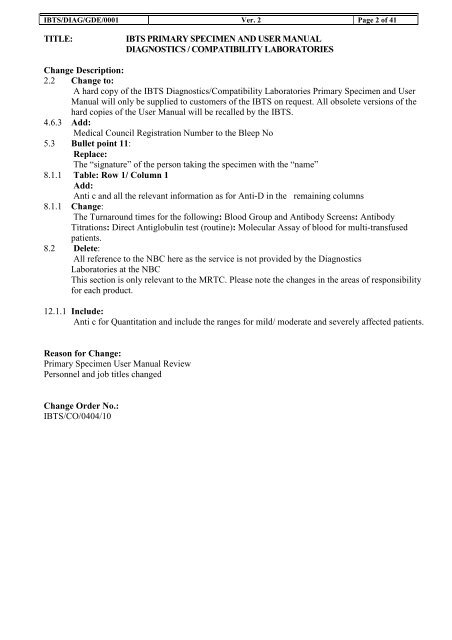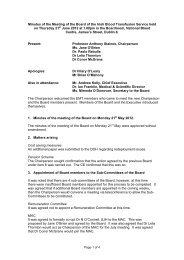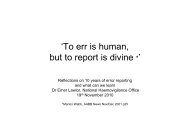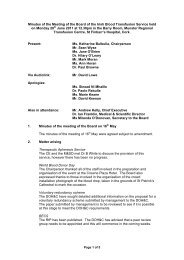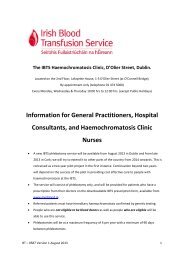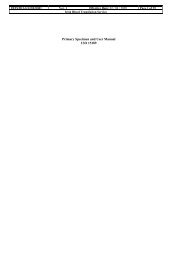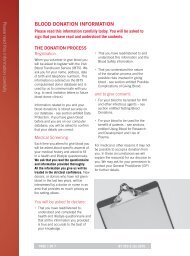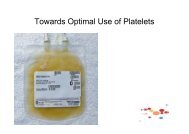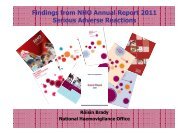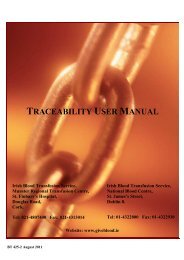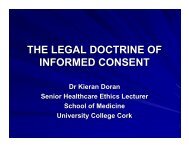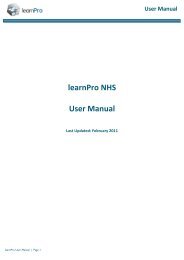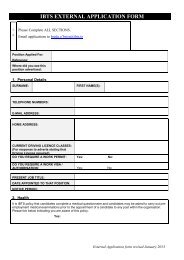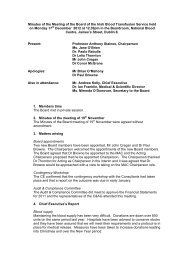IBTS DIAG GDE 0001 - Irish Blood Transfusion Service
IBTS DIAG GDE 0001 - Irish Blood Transfusion Service
IBTS DIAG GDE 0001 - Irish Blood Transfusion Service
- No tags were found...
You also want an ePaper? Increase the reach of your titles
YUMPU automatically turns print PDFs into web optimized ePapers that Google loves.
<strong>IBTS</strong>/<strong>DIAG</strong>/<strong>GDE</strong>/<strong>0001</strong> Ver. 2 Page 2 of 41TITLE:<strong>IBTS</strong> PRIMARY SPECIMEN AND USER MANUAL<strong>DIAG</strong>NOSTICS / COMPATIBILITY LABORATORIESChange Description:2.2 Change to:A hard copy of the <strong>IBTS</strong> Diagnostics/Compatibility Laboratories Primary Specimen and UserManual will only be supplied to customers of the <strong>IBTS</strong> on request. All obsolete versions of thehard copies of the User Manual will be recalled by the <strong>IBTS</strong>.4.6.3 Add:Medical Council Registration Number to the Bleep No5.3 Bullet point 11:Replace:The “signature” of the person taking the specimen with the “name”8.1.1 Table: Row 1/ Column 1Add:Anti c and all the relevant information as for Anti-D in the remaining columns8.1.1 Change:The Turnaround times for the following: <strong>Blood</strong> Group and Antibody Screens: AntibodyTitrations: Direct Antiglobulin test (routine): Molecular Assay of blood for multi-transfusedpatients.8.2 Delete:All reference to the NBC here as the service is not provided by the DiagnosticsLaboratories at the NBCThis section is only relevant to the MRTC. Please note the changes in the areas of responsibilityfor each product.12.1.1 Include:Anti c for Quantitation and include the ranges for mild/ moderate and severely affected patients.Reason for Change:Primary Specimen User Manual ReviewPersonnel and job titles changedChange Order No.:<strong>IBTS</strong>/CO/0404/10
<strong>IBTS</strong>/<strong>DIAG</strong>/<strong>GDE</strong>/<strong>0001</strong> Ver. 2 Page 3 of 41TITLE:<strong>IBTS</strong> PRIMARY SPECIMEN AND USER MANUAL<strong>DIAG</strong>NOSTICS / COMPATIBILITY LABORATORIESCONTENTSPAGE1.0 Introduction ………………………………………………………………………………. 5-62.0 Guide to Using this Manual ……………………………………………………………... 63.0 Quality Policy ……………………………………………………………………………. 64.0 General Information ……………………………………………………………………... 7 - 104.1 Laboratory Directors … …………………………………………………………… 74.2 <strong>IBTS</strong> Laboratory Personnel –Medical/Medical Scientific ………..…………………… 74.3 <strong>Service</strong> Operating Times ………………………………………………………….. 74.4 Specimen Scheduling ……………………………………………………………… 7-84.5 Diagnostics/Compatibility Laboratories Contact Details …………………………… 84.6 Contacting the Diagnostics/Compatibility Laboratory with an Urgent Request forEmergency <strong>Service</strong>s……………………………………………………………….. 84.6.1 Routine Hours ……………………………………………………………………… 84.6.2 Out of Hours ……………………………………………………………………… 94.6.3 Procedure to be Followed for Urgent Request ……………………………………… 94.7 <strong>Service</strong> Fees and Charges ……................................................................................... 105.0 Laboratory Request Forms, Specimen Bottles and Containers …………………………… 10 - 165.1 General Information Re: Specimen Collection...……………………………..………… 105.2 Categories of Request Forms available at the <strong>IBTS</strong> Diagnostics Laboratory …………….. 105.2.1 Process for Ordering the <strong>IBTS</strong> Request Forms ………………………………………… 105.3 Completion of Request Forms …………………………………………….. 115.4 Labelling the Specimen ……………………………………………………………….. 11-125.4.1 Mandatory Requirements ……………………………………………………………… 115.4.2 Labels on Specimen Bottles ……………………………………………………………. 125.4.3 Requirement to sign the declaration …………………………………………………… 125.5 Exceptions ……………………………………………………………………………… 125.6 Quality of <strong>Blood</strong> Specimens (Vis-à-Vis Condition and Timing) ……………………….. 135.6.1 Timing of Specimen Collection in Relation to Previous <strong>Transfusion</strong>s ………………….... 135.6.2 Crossmatching Requests, Reference Specimens ………………………………………… 135.7 Non-Conforming Specimen Bottles, Forms or Specimen Quality Issues........................... 13-165.7.1 Specimens: Condition/Documentation and Appearance/Quality Issues………………… 145.7.2 Specimen Request Form Issues ………………………………………………………… 155.7.3 General Information Re: Specimens and Forms …............................................................ 166.0 Delivery, Packaging, Storage and Transport Requirements of Diagnostic Specimens ……... 16 - 176.1 Specimen Delivery ……………………………………………………………………… 166.2 Specimen Packaging and Transport ……………………………………………………… 166.2.1 International Carriage of Dangerous Goods by Road ……………………………………. 166.2.2 Universal Packaging Procedure for the Transport of Diagnostic Specimens ……....…… 176.2.3 Disposal of Waste Material Used in Specimen Collection ……………………………….. 176.3 Storage of Specimens …………………………………………………………………….. 176.4 Delivery of Routine Diagnostic Specimens:-Out of Hours ……………….………….…… 177.0 External and Internal Quality Assessment Programmes ……………………………………… 187.1 External Quality Assessment Programmes ………………………………………………. 187.2 Internal Quality Assessment Programmes ……………………………………………… 187.3 Outcome of a Major Non-Conformance …………………………………………………. 18
<strong>IBTS</strong>/<strong>DIAG</strong>/<strong>GDE</strong>/<strong>0001</strong> Ver. 2 Page 4 of 418.0 Laboratory Tests and <strong>Service</strong>s .....................................................................................................19 - 298.1 <strong>Service</strong>s Provided by the <strong>IBTS</strong> Diagnostics Laboratories ………………… …… 198.1.1 Test Profiles and Turnaround Times …………………………………………………….. 19 - 268.2 Provision of <strong>Blood</strong>/<strong>Blood</strong> Components …………………………………………………. 278.2.1 Provision of Red Cells (Stock)……………………………………………………………. 288.2.2 Provision of Platelet Components ……………………………………………………… 288.2.3 Provision of Rare Donor Red Cells from International Rare <strong>Blood</strong> Programmes ……… 288.3 Consultancy and Pathology <strong>Service</strong>s ……………………………………………………… 288.4 Haemovigilance Advisory <strong>Service</strong> …………………………………. 298.5 Repeat Examination due to Analytical Failure or Further Examination of the PrimarySpecimen ………………………………………………………………………………….. 298.5.1 Repeat Examination due to Analytical Failure …………………………………………… 298.5.2 Further Examination of the Primary Specimen …………………………………………… 298.5.3 Referring specimens to an external laboratory for further investigations ………………298.6 External Laboratory Testing ……………………………………………………………… 299.0 Reporting of Test Results ………………………………………………………………………… 30 - 319.1 Approval of Test Results and Issuing Reports ……………………………………………. 309.2 Issuing Reports on Critical Specimens where the Results are delayed …………………… 309.3 Reporting of Results by Fax ………………………………………………………………. 309.4 Telephoned Results ………………………………………………………………………... 319.5 Archiving of Patients Records …………………………………………………………….. 3110.0 Review and Assessment of Customer Satisfaction ……………………………………………... 31 - 3210.1 <strong>Service</strong> Level Agreements……………………………………………………………… 3110.2 Customer Complaints ……………………………………………………………………... 3210.3 Quality Management Review………………....………………………………………….. 3210.4 Customer Liaison ………………………………………………………………….. 3210.5 Hospital <strong>Transfusion</strong> Committees……………………………………………………….. 3210.6 Continuous Improvement ………………………………………………………………….. 3211.0 Traceability and reporting of Serious Adverse Reactions (SARs) andSerious Adverse Events (SAEs) ……………………………………………………………….....33 - 3411.1 Traceability ………………………………………………………………………………. 3311.2 Serious Adverse Reactions and Serious Adverse Events………………………………….33 - 3412.0 Guidelines: Medical/Scientific …………………………………………………………………… 35 - 3812.1 Ante-Natal Guidelines …………………………………………………………………….. 3512.1.1 Specimens for Quantitation (AntiD/c)………………………………………………….. 3512.1.2 Ante-Natal Specimens for Antibody Titration …………………………………………… 3612.2 Guidelines for the Collection of Specimens from Previously Transfused Patients …….... 3712.3 Guidelines for the Storage of Specimens: Pre Testing ……………………………………. 3712.4 Guidelines for Storage of Examined Specimens for Archive and Look Back Purposes ….. 3712.5 Guidelines for Processing Specimens with Special Requirements Outside of theRoutine Working Day ……………………………………………………………………... 3812.5.1 Non Compliance with the Turnaround Times …………………………………………….. 3813.0 Index of Tests and <strong>Service</strong>s Provided ……………………………………………………………. 39 - 4113.1 Tests……………………………………………………………………………………… 39 - 4013.2 <strong>Service</strong>s ……………………………………………………………………………………. 41
<strong>IBTS</strong>/<strong>DIAG</strong>/<strong>GDE</strong>/<strong>0001</strong> Ver. 2 Page 5 of 41TITLE:<strong>IBTS</strong> PRIMARY SPECIMEN AND USER MANUAL<strong>DIAG</strong>NOSTICS / COMPATIBILITY LABORATORIES1.0 INTRODUCTION1.1 This manual is designed to provide an overview of the services available from the diagnostics/ compatibility laboratories of the <strong>IBTS</strong>.This manual is intended for both the users of the routine diagnostics / compatibility servicesand of the reference immunohaematology service.1.2 Section 8.1 of this manual identifies the services provided by the <strong>IBTS</strong> diagnostic/compatibilitylaboratories to their customers/users: namely the hospitals, hospital blood banks and medicalpractitioners in the public and private health care sectors.1.3 This manual specifies the minimum requirements for the labelling of specimens and for thecompletion of request forms to ensure sufficient information is received for the requestedservice to be optimally delivered.This manual is a controlled document as part of the <strong>IBTS</strong> Quality Management System.1.4 All diagnostics /compatibility services undergo continuous review through quality assuranceand audit activities. The laboratories are committed to obtaining and maintaining theInternational Standard ISO 15189 (current version).1. 5 The <strong>IBTS</strong> diagnostics /compatibility laboratories are committed to compliance to S1 547 of2006 incorporating Articles 14 and 15 of Directive 98/ 2002/EC (Traceability Requirements,Notification of SAR/E).1.6 The <strong>IBTS</strong> diagnostics /compatibility laboratories are subject to regular scheduledinspection by the IMB for compliance as a <strong>Blood</strong> Establishment to the relevant EU Directivesand <strong>Irish</strong> Statutory Instruments (SI 360 of 2005,SI 547 of 2006, SI 562 of 2006)1. 7 The <strong>IBTS</strong> diagnostics / compatibility laboratories use CE marked IVD kits, controls andreagents in accordance with manufacturer’s instructions .Likewise all validated technologyand systems used are CE marked with the appropriate documentation supplied.1.8 Specimens are disposed of by <strong>IBTS</strong> in accordance with <strong>IBTS</strong> Health and Safety proceduresand, in compliance with waste management regulations.1.9 The <strong>IBTS</strong> diagnostics /compatibility laboratories use validated methods and procedures.Where the <strong>IBTS</strong> laboratories intend to change a testing procedure such that the results or theirinterpretation could be significantly different, users will be notified in writing.1.10 The <strong>IBTS</strong> operates a calibration and maintenance schedule for all equipment.1.11 The <strong>IBTS</strong> will accept correctly completed blood request forms / service requests fromdesignated facilities requesting its service provided the pertinent details are completed and thespecimens accompanying the forms meet the current specified criteria.Authorised personnel will review test request documentation to determine suitability of testsrequested (standard investigations, reference investigations and urgent requests).
<strong>IBTS</strong>/<strong>DIAG</strong>/<strong>GDE</strong>/<strong>0001</strong> Ver. 2 Page 6 of 411.12 The <strong>IBTS</strong> diagnostics /compatibility laboratories operate to internal policies and proceduresfor all activities as defined by the <strong>IBTS</strong> Quality Management System.1.13 <strong>IBTS</strong> laboratory management is committed to Staff recruitment, training, development and retention at all levels to provide a full andeffective service to its users. The proper procurement, validation and maintenance of such equipment and otherresources as are needed for the provision of the service. The handling of all specimens in such a way as to ensure specimen integrity and therebythe correct performance of laboratory examinations. The use of accredited examination procedures and methods that will ensure the highestachievable quality of all tests performed. Reporting results of examinations in ways which are timely, confidential, accurate andclinically useful. The assessment of user satisfaction, in addition to internal audit and external qualityassessment, in order to effect continual quality improvement. Notification to users of significant changes to <strong>IBTS</strong> diagnostics /compatibilitylaboratories process’s/ procedures prior to implementation.2.0 GUIDE TO USING THIS MANUAL2.1 A copy of this manual is available on the internet,www.giveblood.ie under ‘Clinical <strong>Service</strong>s’ – ‘Clinical and Diagnostic <strong>Service</strong>s’ – ‘<strong>IBTS</strong>Primary Specimen User Manual - Diagnostics/Compatibility Laboratories”2.2 A hard copy of the <strong>IBTS</strong> Diagnostic / Compatibility Laboratories Primary Specimen and UserManual will only be supplied to customers of the <strong>IBTS</strong> on request. All obsolete versions ofthe hard copies of the User Manual will be recalled by the <strong>IBTS</strong>.2.3 When key changes are made to either the tests or the services identified in this manual, thecustomer will be notified in writing. The electronic copy of the manual will be modified andmade available to the customer. The hospital hard copy will be withdrawn and returned to the<strong>IBTS</strong>.3.0 QUALITY POLICY3.1 In order to ensure that the needs and requirements of users (and ultimately patient’s needs)are appropriately met the <strong>IBTS</strong> diagnostics/compatibility laboratories will: Operate a Quality Management System to integrate the organizations procedures,processes and resources in the laboratories, in compliance with the Quality Manual. Set quality objectives and plans in order to implement the Quality Policy (as defined in<strong>IBTS</strong> Quality Policy Statement). Ensure that all staff are familiar with this quality policy to ensure user satisfaction. Commit to the health, safety and welfare of its entire staff. These laboratories areunsuited to visitors in order to minimize task interruption. However, where authorized,visitors to the departments will be treated with respect and due consideration will be givento their safety while on site. Uphold professional values and good professional practice and conduct.
<strong>IBTS</strong>/<strong>DIAG</strong>/<strong>GDE</strong>/<strong>0001</strong> Ver. 2 Page 7 of 414.0 GENERAL INFORMATION4.1 Laboratory DirectorsNational <strong>Blood</strong> Centre: Dr Joan Fitzgerald, Consultant HaematologistMunster Regional <strong>Transfusion</strong> Centre: Dr Joan Power, Consultant Haematologist4.2 <strong>IBTS</strong> Laboratory Personnel– Medical/Medical ScientificThe laboratories welcome your queries. For Medical and /or Medical Scientific advice pleasecontact the personnel as tabulated below.CONTACTS NBC MRTCChief of DiagnosticsLaboratory.Consultant HaematologistMr John Crumlish01-4322800Dr Joan Fitzgerald01-4322800Or on-call medical specialist01-4322800Mr Kevin Sheehan021-4807400Dr Joan Power 021-4807400Or on-call medicalspecialist021-48074004.3 <strong>Service</strong> Operating TimesDepartment/activity Opening Hours NBC Opening Hours MRTCSpecimen Reception Security: 24 Hrs Despatch: 24 HrsRoutine LaboratoryDiagnostic/Compatibility <strong>Service</strong>Emergency out of hours service(on-call diagnostic service)Bank holidays(on-call diagnostic service)4.4 Specimen SchedulingMonday to Friday 9.00 am –5.00 pmExcluding bank holidaysContact scientist on -call /duty (24hrs) 01 4322800(switch)Contact scientist on -call /duty (24hrs) 01 4322800(switch)Monday to Friday 9.00am –5.00pm (refer to 4.4)Excluding bank holidaysContact scientist on-call /duty (24hrs)( 0214807400)(switch)Contact scientist on-call /duty (24hrs)(021 4807400)(switch)4.4.1 Munster Regional <strong>Transfusion</strong> Centre. (MRTC)Please note the MRTC diagnostics laboratory operates a batch testing system. Routine servicerequests are processed in the next batch (please refer to section 8.1.1 of this document). TheMRTC laboratory currently operates a system of two batch runs daily - at 09:00 hrs and at 13:00hrs and Friday ‘s 13.30hrs. Specimens received before these times will be processed in the nextscheduled batch unless they are to be treated as an emergency and the laboratory has been phonedto inform them of the urgency of the request. Specimens tested in the batch system will notaccrue an additional emergency charge.
<strong>IBTS</strong>/<strong>DIAG</strong>/<strong>GDE</strong>/<strong>0001</strong> Ver. 2 Page 8 of 414.4.2 <strong>IBTS</strong> Diagnostics/Compatibility Laboratories (MRTC and NBC)Specimens which are referred from another laboratory, that may require compatible units, will beprocessed during the routine working day. However if the <strong>IBTS</strong> is contacted by telephone toadvise of a clinical urgency a provision will be made to process the specimen urgently or out ofhours if required.4.5 Diagnostics/Compatibility Laboratories Contact DetailsSECTION NBC MRTCLaboratory office/SwitchBoardDiagnostics LaboratoryRoutine Mon-Fri01-432296601-4322972, 4322973021-4807418 /021 4807400021-4807417,021-4807418Out of hours01-4322800 (Switch)Ask for medical scientist onduty/call.021-4807400 (Switch)Ask for medical scientiston duty/call.Clinical issuesOut of hours contact number01-4322800 (Switch)Ask for doctor on duty/call.021-4807400 (Switch)Ask for doctor onduty/call.Platelet issuesLaboratory Fax No.01-4322969,(Routine 9am – 5pm)01 4322800(out of hours)01-4322709(Diagnostic laboratory)01-4322942Despatch (Product requests)021-4807417/ 4807418(Routine-9am- 5.00pm)021-4807400 (Switch)(out of hours)021-4323315(Diagnostic laboratory)Main reception Fax No. 01-4322930 021-43130144.6 Contacting the Diagnostics / Compatibility Laboratory with an Urgent Request for Emergency<strong>Service</strong>sRequests must be made by a Medical Officer or another designated staff member. The identity of theperson initiating the request will be documented, as will the identity of the <strong>IBTS</strong> staff memberreceiving the request. Please advise the <strong>IBTS</strong> as soon as possible where the level of urgency of therequest/ service status changes (inc. service no longer required).4.6.1 Routine HoursContact:The Diagnostics /Compatibility Laboratory at either the NBC or the MRTC. (See 4.5 above)
<strong>IBTS</strong>/<strong>DIAG</strong>/<strong>GDE</strong>/<strong>0001</strong> Ver. 2 Page 9 of 414.6.2 Out of Hours<strong>IBTS</strong> Diagnostics Laboratory as a Hospital <strong>Blood</strong> BankThe <strong>IBTS</strong> provides an emergency blood group and compatibility service out of hours forhospitals where the <strong>IBTS</strong> acts as a hospital blood bank and have in place a service levelagreement (SLA). A stock of O RhD negative, uncrossmatched blood will be held at the <strong>IBTS</strong>for issue in emergency situations For turnaround times for response to emergency request for compatible blood see section 8.1<strong>IBTS</strong> Diagnostics Laboratory as Referral CentreThe <strong>IBTS</strong> (NBC and MRTC) also provides a referral service for the hospital blood banks.Requests for emergency immunohaematology services / compatible blood out of hours will beassessed in accordance with the urgency of the request by the <strong>IBTS</strong> Registrar /SpMO /ConsultantHaematologist.To request these emergency services, contact switch and request to speak to the medical scientist ormedical personnel on-call. (For both centres)4.6.3 Procedure to be followed for Urgent RequestsWhen making the request the following details will be requested and confirmed (by reading back tothe person giving the information): Hospital / Ward Name of Person making the request / Medical Council Registration number and Bleep number(if possible) The urgency of the request (date and time required) and estimated time of specimen arrival Patients Name (if known), hospital / emergency / trauma number and Date of Birth.In addition the following details will be confirmed to the medical scientist: Number and type of component requested. <strong>Blood</strong> Group, ABO/ Rh/K type, if known (from referral laboratory only) Reason for transfusion <strong>Transfusion</strong> history (if known) Relevant clinical condition.Note:1. Where a clinical condition dictates that a transfusion is required prior to the completion oftesting, the transfusion support may vary depending on the degree of clinical urgency, theavailability of an emergency stock of red cells on site at the hospital and prior availability ofthe patient’s specimen and validated blood group at the <strong>IBTS</strong>.2. Where the provision of blood is clinically required, prior to completion of compatibilitytesting and where the patient’s specimen is not known to contain clinically significantantibodies, transfusion support will be provided by the <strong>IBTS</strong> or issued from the hospital’sown stock.3. Where antibodies are detected in the patient’s specimen which would put the patient at riskfrom a blood transfusion, the relative risks of abbreviated testing prior to emergencytransfusion will need to be discussed between the <strong>IBTS</strong> medical consultant / specialist officerand the clinician in charge at the hospital.
<strong>IBTS</strong>/<strong>DIAG</strong>/<strong>GDE</strong>/<strong>0001</strong> Ver. 2 Page 10 of 414.7 <strong>Service</strong> Fees and ChargesA list of current services fees and charges, with detailed information regarding out of hours service charges,is available from:- Director of finance, NBC (01 4322800)- Administration, Munster Regional <strong>Transfusion</strong> Centre (021-4807490 /021-4807492)5.0 LABORATORY REQUEST FORMS, SPECIMEN BOTTLES AND CONTAINERS5.1 General Information: Re Specimen CollectionIt is the responsibility of the <strong>Service</strong> Requestor to; Obtain consent from the patient for the tests required at the <strong>IBTS</strong> Diagnostics Laboratory. Provide information and instructions to patients in relation to their own preparation prior to the takingof specimens for referral to <strong>IBTS</strong> Diagnostics Laboratory Positively identify the patient from whom the specimen is taken. Safely dispose of the materials used in the collection of specimens. Ensure that the test / services requested are appropriate. Ensure that specimens are delivered to the <strong>IBTS</strong> Diagnostics Laboratory within a timeframeappropriate to the nature of the tests requested. Ensure that appropriate transport containers are used (for the safety of all handlers). Ensure that patient confidentiality is maintained.5.2 Categories of Request Forms Available at the <strong>IBTS</strong> Diagnostics LaboratoryThe <strong>IBTS</strong> Diagnostics laboratories have a number of different request forms available tohospitals. These are used for different diagnostics tests as outlined below.BT.7<strong>Blood</strong> Group and Compatibility Request FormThis form is used to accompany specimens to determine blood group (Group andantibody screen/ hold specimen) in order to have the option of ordering blood orblood components and requesting compatible units for a patient.BT. 345 Request for Red Cell Immunohaematology Investigation FormThis form is used by referring hospitals when they require the <strong>IBTS</strong> to undertakespecial investigations to resolve blood group serological anomalies and antibodyinvestigations. This form may also be used by hospital blood banks for Ante-Natalinvestigation, e.g. antibody titre and Anti-D/c quantitation.BT.311 <strong>Transfusion</strong> Reaction Investigation FormThis form is used where the <strong>IBTS</strong> have supplied compatible blood to its users (see1.2), who now wish to report a suspected adverse reaction to a blood transfusion andwho request investigation for same.5.2.1 Process for ordering the <strong>IBTS</strong> Request Forms.The above forms are available on request from <strong>IBTS</strong> centres by contacting personnel in thefollowing departments:(a) NBC: Diagnostics Department (01-4322972, 01-4322973)Diagnostics Office (01-4322966)(b) MRTC: Despatch Department (021-4807419, 021-4807420)Diagnostics/Compatibility Dept (021-4807417, 021-4807418)
<strong>IBTS</strong>/<strong>DIAG</strong>/<strong>GDE</strong>/<strong>0001</strong> Ver. 2 Page 11 of 415.3 Completion of Request FormsThe following essential information must be documented in a legible manner on therequest form1. Patient's Surname,*2. Patient’s Forename*3. Patient's Date of Birth,*4. Hospital number,*5. Patient's gender,6. Referring hospital and ward7. Patient’s address8. The name of the requesting clinician9. Test(s) required10. Number of units of blood required (if for crossmatching)11 Date (and time where blood is requested) of specimen collection and the name of persontaking the specimen12. Relevant clinical information appropriate to the test(s) requested must be supplied13 <strong>Transfusion</strong> history/ history of administration of Anti-D/Antenatal history etc, is alsorelevant14. Specific transfusion requirements for individual patients. If modified blood componentsare required i.e. CMV negative and / or Irradiated, this should be indicated on therequest form.15. The specific clinical indication for a transfusion request must be documented on thetransfusion form.16. A clear indication as to whether the tests/services requested are urgent or routine.17. A signed declaration by the person taking or referring the sample regarding its validityand completeness as indicated in 5.4.3 below.* These are the mandatory patient personal identifiers which must be provided on therequest form and the specimen for acceptance for testing by the Diagnostics LaboratoryNote:The <strong>IBTS</strong> Diagnostics Laboratories must be telephoned in advance if the service requested isurgentADDRESSOGRAPH LABELS ARE NOT ACCEPTABLE BY MRTC ON ANYREQUEST FORM5.4 Labelling the Specimen5.4.1 Mandatory RequirementsThe following essential information is MANDATORY on all specimens referred to the <strong>IBTS</strong>and should be documented in a legible manner on the specimen container:-1. Patient's Surname2. Patients Forename3. Date of birth4. Hospital number (For out patients an address will suffice.)5. Date and time of specimen collection6. The initials/ signature of the person collecting the specimenNote:All patient specimens and forms must be labelled at the bedside to prevent misidentificationand labelling errors.
<strong>IBTS</strong>/<strong>DIAG</strong>/<strong>GDE</strong>/<strong>0001</strong> Ver. 2 Page 12 of 415.4.2 Labels on Specimen Bottles Labels pre-printed away from the bedside (commonly known as addressograph labels)are not acceptable on specimens for processing and a repeat specimen will be required. Demand- printed labels, produced by the use of hand-held bedside scanners and printersutilising bar-coded wristbands are acceptable and may even increase security duringphlebotomy.(BCSH Guidelines for Compatible Procedures in <strong>Blood</strong> <strong>Transfusion</strong>Laboratories) The <strong>Service</strong> Requestor’s responsibility is to ensure that all printed labels for specimensfor blood transfusion testing are generated at the bedside and are compliant with BCSHGuidelines. The use of bedside printed labels by hospitals must be pre-arranged by agreement withthe <strong>IBTS</strong> Diagnostics Laboratories.5.4.3 Requirement to Sign the DeclarationThe person referring the specimen (BT345 request form), or taking the specimen (BT7 requestform) must complete the declaration section of the request form and ensure that the patients’details on the request form and on the specimen are correct. Failure to complete the declarationmay result in the specimen not being processed.5.5 Exceptions:5.5.1 Exceptions may be made from specimens from the following groups:Trauma, unconscious, or Emergency Department patients where the identity is not yetestablished: The minimum clinical information supplied must include a (1) uniquenumber, (2) gender and (3) approximate age (It would be beneficial to be informed of theethnicity of the patient).Where a repeat specimen would be difficult to obtain and the result of testing is not to beused for transfusion purposes.Investigations where the delay in acquiring a new specimen might seriously prejudice asuccessful clinical outcome.Investigations where the specimen cannot be replaced, e.g. pre transfusion specimenspost transfusion reaction, specimens taken at specific time periods e.g. Foetal specimens.In the above exceptional circumstances non compliant specimens may be accepted for testingwith a documented authorised concession (e.g. a fax from the requesting clinician verifying thepatient identity) where delay in acquiring a new specimen may seriously prejudice a successfulclinical outcome for a patient, or where the specimen cannot be replaced. In such cases the<strong>IBTS</strong> will not be responsible for errors made as a result of unacceptable labelling and/orspecimens issued by the referring facility. This may impact on the labelling and release of thesuitable component, such that the component will be issued for transfusion at the discretion ofthe patient’s clinician.The decision to process the specimen may require approval by the clinician at the <strong>IBTS</strong>.In all those instances the test report will identify and reflect the non-conforming issue.
<strong>IBTS</strong>/<strong>DIAG</strong>/<strong>GDE</strong>/<strong>0001</strong> Ver. 2 Page 13 of 415.6 Quality of <strong>Blood</strong> Specimens (Vis–à-Vis Condition and Timing)Specimens for Compatibility testing should be referred to the laboratory without delay tofacilitate timely testing of the specimens and processing of requests5.6.1 Timing of Specimen Collection in relation to Previous <strong>Transfusion</strong>.<strong>Transfusion</strong>s or pregnancy may stimulate the production of unexpected antibodies througheither a primary or secondary response. The timing of specimens selected for crossmatching orantibody screening must take account of this. (See guidelines Section 12.1 and 12.2)5.6.2 Crossmatching Requests, Reference Specimens.In situations where patients are being repeatedly transfused (e.g. AIHA, SCD, etc) a dailyspecimen is not a requirement. These patients should be screened with a fresh specimen for thedevelopment of irregular antibodies at least every 72 hours, with the agreement of <strong>IBTS</strong> and thepatient’s clinician.In the case of pregnant women who are booked for elective caesarean section and who may notpresent to the hospital until shortly before surgery, specimens used for pre-transfusion testingin these patients should never be more than 7 days old and where possible, it is advisable that aspecimen taken immediately before transfusion be made available for retrospective testing inthe event of a transfusion reaction occurring.Note:The user must be aware that the presence of haemolysis or clots may make the specimens unsuitable forprocessing.Where specimens are found to be unsuitable on receipt at the <strong>IBTS</strong> Diagnostics Laboratory, a secondspecimen will be requested.5.7 Non-Conforming Specimen Bottles, Forms or Specimen Quality IssuesWhere the requirements with respect to labelling of the request form/ specimen container orspecimen quality issues are not met, the following will apply.
<strong>IBTS</strong>/<strong>DIAG</strong>/<strong>GDE</strong>/<strong>0001</strong> Ver. 2 Page 14 of 415.7.1 Specimens: Condition/Documentation and Appearance/Quality issues5.7.1.1 Condition/DocumentationSPECIMEN ISSUESACTIONREQUESTOR No specimen received A second specimen must becollected with a request form.Specimen collected but dateand time of collection notindicatedWhere it is a life threateningemergency, requiringcrossmatched units, the Patient’sClinician must acceptresponsibility by providing asigned fax to that effect.A second specimen with a requestform is requested in this situationIn non urgent situations a secondspecimen must be collected witha new request form Specimens unlabelled A second specimen must becollected with a request formAbsence of, or majordiscrepancy in any of themandatory unique patientidentifiers on the specimenAddressograph label onspecimensA second specimen must becollected with a request form.ACTION <strong>IBTS</strong> <strong>DIAG</strong>NOSTICSLABORATORYHospital / GP will be phonedinforming them of the event. Thiswill be documented on the requestformIf tested the report will show thenon-conforming event.This will be recorded on therequest form.Specimens will NOT be processedHospital / GP will be phonedinforming them of the event. Thiswill be documented on the requestform.For urgent situations seeExceptions (Section 5.4)Concessionary release will requirea signed fax to that effect. Miscellaneous specimen issues Dealt with on a case by casebasisSpecimen Appearance/ Quality IssuesSPECIMEN APPEARANCE /QUALITY ISSUES Evidence of HaemolysisAge of specimen.Integrity of specimenMiscellaneous quality issuesACTION -REQUESTORA second specimen will berequested as appropriate. Separated Specimens A second specimen must becollected with a request form asappropriateACTION <strong>IBTS</strong> <strong>DIAG</strong>NOSTICSLABORATORYThe Laboratory will make adecision whether or not thespecimen is suitable for testing andmay report results unaffected bythe specimen quality, while notreporting test results that may beaffected by the quality of thespecimen.If tested and appropriate the reportwill show the non-conformingeventHospital / GP will be phonedinforming them of the event. Thiswill be documented on the requestform
<strong>IBTS</strong>/<strong>DIAG</strong>/<strong>GDE</strong>/<strong>0001</strong> Ver. 2 Page 15 of 415.7.2 Specimen Request Form IssuesFORM ISSUES- No request form provided with thespecimen.- Inadequate or incorrect patientdetails:- hospital number name ( incomplete / incorrectspelling of forename orsurname) date of birth- Borderline examples:clinical information (not supplied) gender Incorrect test requested No test requested Address (absent/incorrect) Ward or location (absent)- Ordering physician not identified- Date and time of collection notindicated / not correct.- Miscellaneous form issuesACTIONREQUESTORA second specimen must becollected with a request form.New specimen requested.Hospital will be informed thatthe specimen is invalid and<strong>IBTS</strong> requires the request tobe repeated.Fax accepting responsibilityfor the labelling of thespecimen and or Telephoneconfirmation may be required.Corrected data to be included(see 5.5 exceptions)Fax accepting responsibilityfor the labelling of thespecimen may be required.Corrected data to be included.(see 5.5 exceptions)ACTION <strong>IBTS</strong> <strong>DIAG</strong>NOSTICSLABORATORYSpecimen may be discarded. Wherethere is an acute emergency, the<strong>IBTS</strong> will allow the clinicianresponsible to accept responsibilityfor taking the specimen by providinga signed fax to the <strong>IBTS</strong> laboratoryto that effect. The request forminformation must be supplied in thefax (see 5.5 Exceptions)Where it is an acute emergency the<strong>IBTS</strong> will allow the clinicianresponsible accept responsibility byproviding a signed fax to the <strong>IBTS</strong>laboratory to that affect, detailingthe corrected patient information( See 5.5 Exceptions)The laboratory will make a decisionon whether or not the specimen issuitable for testing. A secondspecimen may be requested.The laboratory will make a decisionon whether or not the specimen issuitable for testing. A secondspecimen may be requested.(See 5.5 Exceptions)Phone hospital and ask for clarificationand / or fax accepting responsibilityfor omission / error.
<strong>IBTS</strong>/<strong>DIAG</strong>/<strong>GDE</strong>/<strong>0001</strong> Ver. 2 Page 16 of 415.7.3 General Information Re: Specimens and FormsIt is the policy of the <strong>IBTS</strong> laboratories to treat all diagnostic specimens as potentiallyinfectious or high risk. Therefore, we advise that universal precautions be taken in thecollection, packaging and the delivery of specimens being sent to the laboratories foranalysis.Specimens for referral should be freshly drawn venous specimens without dilution by IVfluid, not exposed to direct sunlight or extremes of temperature, transported at roomtemperature (unless for referral for cold agglutinins) as expediently as possible to the <strong>IBTS</strong>laboratory.If specimens are required to be stored prior to referral to the <strong>IBTS</strong> laboratory, they shouldbe stored at 4ºC. For exceptions to this see 6.3 “Storage of Specimens”.Specimens referred to the <strong>IBTS</strong> laboratories should conform to the requirements for thetiming of specimen collection, as defined in Section 5.6.1.Specimen forms/ packaging are date and time stamped on receipt at the <strong>IBTS</strong>.On receipt in the laboratory, specimens are registered with an <strong>IBTS</strong> specimen number andrecorded in a registration log book, as per Standard Operating Procedures. All storedaliquots from the primary specimen are labelled with the <strong>IBTS</strong> specimen number.<strong>IBTS</strong> scientific staff will review request forms and specimens to determine if they aresuitable for the tests requested. Where it is determined that the request form and/orspecimen is not suitable, the requesting hospital will be informed.Incorrect or incomplete forms/ specimens may result in the tests not being undertakenand may require a second specimen to be submitted resulting in increasedTurnaround Times with service delay6.0 DELIVERY, PACKAGING, STORAGE AND TRANSPORT REQUIREMENTS OF<strong>DIAG</strong>NOSTIC SPECIMENS6.1 Specimen DeliveryDiagnostic specimens will be accepted by <strong>IBTS</strong> laboratories at any time. Those delivered byhand (arriving by taxi/courier/ambulance/post) must be left with security at the NBC, and withdespatch at the MRTC.6.2 Specimen Packaging and TransportIt is the policy of the <strong>IBTS</strong> to treat all diagnostic specimens as potentially infectious or highrisk. It is advised that universal precautions be taken in the collection, packaging and deliveryof the specimen to the <strong>IBTS</strong> and that the patient’s confidentiality is protected.6.2.1 International Carriage of Dangerous Goods by Road.The requirements stated below apply to all diagnostic specimens directed to the <strong>IBTS</strong>diagnostic laboratories. (The packaging labelling and transportation of all specimens mustcomply with the Guidelines laid down for the International Carriage of Dangerous Goods byRoad UNADR).
<strong>IBTS</strong>/<strong>DIAG</strong>/<strong>GDE</strong>/<strong>0001</strong> Ver. 2 Page 17 of 416.2.2 Universal Packaging Procedure for the Transport of Diagnostic Specimens. Specimens to be sent should be stored in a secure (preferably plastic) primary container. Wrap the specimen bottle/container in tissue or cotton wool which will act as absorbentmaterial in the event of spillage. Place the specimen bottle/container in a biohazard bag (supplied with the request form) Place the biohazard bag (attached to the request form) with the specimen bottle in a paddedenvelope or an approved transport container. Label the envelope with a hazard warning label, “diagnostic specimen, Category B UN3373”. Place the name, address and contact number of the destination laboratory on the outsideenvelope. The specimen can be transported or posted as appropriate The specimen and the request form should be so packaged so as to ensure patientconfidentially at all times during transportation.Note:There is no requirement for a licensed courier to transport non infectious diagnostic specimens.6.2.3. Disposal of Waste Material Used in Specimen Collection.All materials used in the collection of diagnostic specimens should be treated as potentiallyhazardous and discarded according to the hospital guidelines for waste management and incompliance with relevant regulations.6.3 Storage of SpecimensWhole-blood specimens will deteriorate over a period of time. Problems associated withprolonged storage include red cell lysis, bacterial contamination, loss of complement in serumand decrease in potency of red cell antibodies, particularly IgM class antibodies. For guidelineson the recommended working limits for the storage of blood testing specimens (pre-analysis)please refer to Section 12.3 of this manual.(Referenced from the BCSH task forcerecommendations 2007)Most blood specimens directed to the diagnostic laboratories will not have special requirementsfor storage other than those recommended in 12.3. However specimens submitted forMolecular Testing may not be refrigerated overnight and must be delivered urgently to the<strong>IBTS</strong> diagnostic laboratories immediately on collection6.4 Delivery of Routine Diagnostic Specimens:- Out of HoursRoutine diagnostic specimens delivered to the laboratory out of hours will be incorporated intothe next routine batch.Note:THE <strong>IBTS</strong> MUST BE TELEPHONED IN ADVANCE OF URGENT REQUESTS ANDTHE SPECIMENS DELIVERED TO THE <strong>IBTS</strong> AS EXPEDIENTLY AS POSSIBLE.
<strong>IBTS</strong>/<strong>DIAG</strong>/<strong>GDE</strong>/<strong>0001</strong> Ver. 2 Page 18 of 417.0 EXTERNAL AND INTERNAL QUALITY ASSESSMENT PROGRAMMES7.1 External Quality Assessment Programmes ( EQA)The Laboratories participate in relevant available external third party assessment schemes.This includes schemes operated by:-NEQAS (UK National External Quality Assurance Scheme) for <strong>Blood</strong> <strong>Transfusion</strong> LaboratoryPractice (NBC/ MRTC)UK AQQAS Scheme for Anti-D/c quantification (NBC)Lab Quality (Finnish External Quality Assurance Scheme) (NBC/MRTC)External proficiency testing is performed by all staff working in the diagnostics / compatibilitylaboratories on an annual frequencyThe laboratories are committed to participating in other schemes as they become available and arerequired to ensure comprehensive assessment of the test repertoire.7.2 Internal Quality Assessment Programmes.The <strong>IBTS</strong> diagnostic /compatibility laboratories are part of the <strong>IBTS</strong> quality management system,which is covered by GMP (Good Manufacturing Practice) and is regularly inspected by the IMB(<strong>Irish</strong> Medicines Board), the <strong>Blood</strong> Establishment Licensing Authority. The <strong>IBTS</strong> <strong>Blood</strong>Establishment is licensed under BE Number 0002Internal controls are included in all tests: no tests can be accepted or reported unless controlresults are acceptable.All test procedures are covered by Standard Operating Procedures and only trained andauthorised staff may perform procedures. Staff competency is also assured before a staff membermay perform a procedure. All procedures are regularly reviewed.7.3 Outcome of a Major Non-ConformanceWhere the diagnostics laboratories may fail an external EQA scheme, or where internal systemsmay have failed resulting in a major non conformance, all users of the service will be informedofficially.Major non-conformances are managed by controlled procedures with investigation, correctiveand preventative actions and review of practices, taken as appropriate. The diagnosticslaboratories (MRTC/NBC) may be audited at any time provided that the director of quality andcompliance and the directors of the laboratories are notified in advance and that the time is agreedby all parties.
<strong>IBTS</strong>/<strong>DIAG</strong>/<strong>GDE</strong>/<strong>0001</strong> Ver. 2 Page 19 of 418.0 LABORATORY TESTS AND SERVICES8.1 <strong>Service</strong>s provided by the <strong>IBTS</strong> Diagnostics Laboratories:Testing of blood specimens for <strong>Blood</strong> Group/Crossmatch/AntibodyInvestigation/Antigen Typing.Provision of <strong>Blood</strong>/<strong>Blood</strong> Components for <strong>Transfusion</strong>Medical and Scientific ConsultancyHaemovigilance Advisory <strong>Service</strong>8.1.1 Test Profiles and Turnaround timesThis table provides guidelines for testing of specimens, special requirements and turnaround times fortest results Initial verbal reports will be provided where emergency testing is performed or critical valuesare being reported Where no component has been issued and an antibody investigation has been carried out bythe <strong>IBTS</strong> Laboratory, a written antibody report will be issued within 5 working days Shouldthe report be accompanied either by a clinical comment or a covering letter from theConsultant Haematologist, this will incur a further delay in the reporting times.Turnaround time is defined as the time from specimen reception at the <strong>IBTS</strong> laboratoryto the time results/services are available for issue.
<strong>IBTS</strong>/<strong>DIAG</strong>/<strong>GDE</strong>/<strong>0001</strong> Ver. 2 Page 20 of 41Test profile / service Centre Specimen type(fresh venousspecimen)Anti DNBC EDTA (WB)QuantitationSpecimenvolume7.5ml<strong>Service</strong> details andrequirementsPerformed three timesweekly.Separated specimenswill not be processedTurnaroundtime testResult phonedwithin 3working daysWritten report -5 working days.Anti-c QuantitationNBCEDTA (WB)7.5mlPerformed weekly.Separated specimenswill not be processedResult phonedwithin 5working daysWritten report 7working daysAntibody TitrationsAntibodyinvestigation*AutoimmuneHaemolytic Anaemia*<strong>Blood</strong> Group /Antibody ScreenROUTINE<strong>Blood</strong> Group /Antibody ScreenEMERGENCY<strong>Blood</strong> Group andCompatibilityTesting (Routine)NBCMRTCNBCMRTCNBCMRTCNBCMRTCNBCMRTCNBCMRTCEDTA(WB)EDTA(WB)EDTA (WB)EDTA(WB)EDTA(WB)EDTA(WB)7.5 ml For urgent testingcontact the lab inadvance.2 x7.5ml2 x7.5mlProgress will bediscussed withrequestor bytelephone.Progress will bediscussed withrequestor bytelephone.3 – 7.5ml Next scheduled batch(See section 4.4)3-7.5ml7.5mlContact <strong>IBTS</strong>laboratory in advance.Processedimmediately onreceipt.Processed on nextroutine batch5 working days5 working days5 working days2-5 workingdaysHowever whereantibodies areinvestigatedsee aboveASAP -Within2 hrs of receiptof specimen.However whereantibodies areinvestigated seeaboveRoutine2-6 hrs
<strong>IBTS</strong>/<strong>DIAG</strong>/<strong>GDE</strong>/<strong>0001</strong> Ver. 2 Page 21 of 41Test profile / service Centre Specimen type(fresh venousspecimen)<strong>Blood</strong> Group andCompatibilityTesting(EMERGENCY)<strong>Blood</strong> Group andCompatibilityTesting for patientswho have red cellimmune antibodies(ROUTINE)/(EMERGENCY)<strong>Blood</strong> GroupingAnomalies (ABO/Rh)NBCMRTCNBCMRTCNBCMRTCSpecimenvolume<strong>Service</strong> details andrequirementsTurnaroundtime testEDTA (WB) 7.5ml Contact <strong>IBTS</strong> ASAP - Within 2laboratory in advance. hrs of receipt ofProcessedspecimenimmediately onreceipt.EDTA (WB)EDTA( WB)Cold Agglutinins MRTC EDTA(WB)(Specimen forinvestigation tobe taken @37˚C andremain @ 37˚Cduringtransportation)Direct AntiglobulinTest( Routine)Direct Antiglobulintest(EMERGENCY)From hospitalswhere <strong>IBTS</strong> acts asthe hospital bloodbank.NBCMRTCNBCMRTCEDTA(WB)EDTA(WB)7.5mlMinimumContact <strong>IBTS</strong>laboratory in advance.Progress can bediscussed bytelephoning the <strong>IBTS</strong>laboratories.7.5ml Progress will bediscussed withrequestor bytelephone.Telephone in advanceif blood is requiredfor patient.7.5 ml Contact MRTClaboratory if patientknown to haveCHAD.3- 7.5ml Next scheduled batch(See section 4.4)3- 7.5 ml Contact <strong>IBTS</strong>laboratory in advance.Processedimmediately onreceipt.2-6 hrsPlease note thisis dependent onthe complexityof antibodiesdetected. Referto Antibodyinvestigation5 working days5 working days2 working daysWhereantibodies areinvestigatedplease seeaboveResult phonedwithin 2 hrs ofreceipt ofspecimen
<strong>IBTS</strong>/<strong>DIAG</strong>/<strong>GDE</strong>/<strong>0001</strong> Ver. 2 Page 22 of 41Test profile / service Centre Specimen type(fresh venousspecimen)Haemolytic Diseaseof the NewbornInvestigation *NBCMRTCEDTA (WB)(Mothers)Specimenvolume7.5 ml<strong>Service</strong> details andrequirementsNext scheduled batch(See section 4.4)Turnaroundtime testResults phonedwithin 1working dayEDTA(WB)Baby’sspecimen1-3 mlMust be telephoned inadvanceNote:* Indicates tests available out of hours for clinically urgent orders
<strong>IBTS</strong>/<strong>DIAG</strong>/<strong>GDE</strong>/<strong>0001</strong> Ver. 2 Page 23 of 41Test profile/serviceMolecularassay forFetal (Rh/K)typing fromMaternalblood 1Molecularassay –Redblood cellgenotyping 1CentreNBCMRTCTo betestedat theIBGRLNBCMRTCTo betestedby theIBGRLSpecimentype(freshvenousspecimen)EDTA(WB)EDTA(WB)Specimenvolume16mlMaternal3mlPartner3.5ml<strong>Service</strong> details andrequirementsTo be referred fortesting to IBGRL.Specimens need to bedelivered to the <strong>IBTS</strong>laboratory immediatelypost collection (Mon-Thurs) for processingwithin 48 hrs ofcollection.This service shouldonly be used forpregnancies which haveprogressed to at least16-20 weeks gestation.To be referred fortesting to IBGRL.Specimen should be asfresh as possible.Turnaround time testResults are generallyavailable from theIBGRL within 7 - 14working days ofspecimen receipt(travel timeincluded). Repeattesting will incur anextension to theturnaround time andpossibly may requirerepeat samplingResults are generallyavailable from theIBGRL within 7 - 14working days ofspecimen receipt(travel time includedand longerdepending oncomplexity).Repeat testing willincur an extension tothe turnaround timeand possibly mayrequire repeatsamplingNote: 1 Denotes a test referred to an external laboratory (please note such referrals attracttesting and transportation charges): Additional time will be incurred where specimens arereferred externally. In such cases the scientific staff at the <strong>IBTS</strong> will inform the requestor.
<strong>IBTS</strong>/<strong>DIAG</strong>/<strong>GDE</strong>/<strong>0001</strong> Ver. 2 Page 24 of 41Test profile / service Centre Specimentype(freshVenousspecimen)Phenotyped <strong>Blood</strong> *(In stock)Phenotyped blood:multiple antigen -negative units *(In stock)Phenotyped blood:High incidenceantigen - negativeunits.*Phenotyped blood:requiringimportation ofsuitable units 1T Cell antigenactivation(ROUTINE)T Cell antigenactivation(EMERGENCY)NBCMRTCNBCMRTCNBCMRTCNBCMRTCMRTCMRTCSpecimenvolume<strong>Service</strong> details andrequirementsN/A None If screening required, timewill be dependant on thecomplexity of screeningrequiredN/A None If screening required, timewill be dependant on thecomplexity of screeningrequiredN/A None Depending on thecomplexity of thescreening required,compatible units may needto be sourced from theother <strong>IBTS</strong> centre and ifnot successful, approval tobe sought from the medicalconsultant / medicalregistrar to call up donors.N/A None If high incidence antigennegative red cells required,discussion with MedicalConsultant / Medicalregistrar may be requiredto call up donors or toobtain suitable units fromthe International <strong>Blood</strong>Bank Rare Donorprogramme where themaximum notice will berequired.The <strong>IBTS</strong> will also requireadequate notificationEDTA(WB)EDTA(WB)2.7 ml Contact MRTC LaboratoryNext scheduled Batch2.7 ml Contact MRTC Laboratoryin advance.Turnaroundtime test10-20 mins toprepare order.10-20 mins toprepare order.Timescaledependent onavailability ofblood andurgency ofrequest, e.g.out- of -hourstesting requireon -callservicesProcurementof productdependent ontheavailability ofthe blood. Aminimum of48 hrsrequired toimport theblood.2 - 3 workingdaysASAP within2 hrs ofreceipt ofspecimenNote: 1 Denotes a test referred to an external laboratory (please note such referrals attracttesting and transportation charges): Additional time will be incurred where specimens arereferred externally. In such cases the Scientific Staff at the <strong>IBTS</strong> will inform the requestor.* Indicates tests available out of hours for clinically urgent orders
<strong>IBTS</strong>/<strong>DIAG</strong>/<strong>GDE</strong>/<strong>0001</strong> Ver. 2 Page 25 of 41CentreSpecimentype(fresh Venousspecimen)Specimenvolume<strong>Service</strong> details andrequirementsTurnaroundtime test<strong>Transfusion</strong>ReactionInvestigation *Where the <strong>IBTS</strong>acts as a Hospital<strong>Blood</strong> Bank<strong>Transfusion</strong>ReactionInvestigation *ReferredspecimensNBCMRTCNBCMRTCEDTA(WB)Pre andPosttransfusionA clotted posttransfusionsample maybe required –check withlaboratoryTheimplicatedunit must bereturned,suitably sealedby a coupler.EDTA(WB)Pre andPosttransfusionA clotted posttransfusionsample maybe required –check withlaboratory7.5ml7.5ml7.5ml(ifrequired)7.5 ml7.5ml7.5ml(ifrequired)Must be telephoned inadvance. Contact medicalconsultant / medicalregistrar on duty / on call,for direction.Please returnImplicated unit (ifavailable)-(even an ‘emptypack’ may provide asample from an attachedsegment),giving set (if possible) andremaining untransfusedunits must be quarantinedat the hospital or returnedto the <strong>IBTS</strong>, pendingmedical release.Part B (white) of thetraceability label (BT396)must not be removed fromthe units when returning tothe <strong>IBTS</strong>.Must be telephoned inadvance.Progress will be discussedwith requestor.ASAP 2-5 hrsof receipt ofspecimen forinitialserologicalresults.Note: Wherebacteriologicalscreening ofthe implicatedunits isrequired, orimmunologicalinvestigation isnecessary, theturnaroundtime may beextendedbeyond 7 daysA writtenreport may behad within 5working daysfor serologicaltesting only.ASAP -2-5 hrsof receipt ofspecimen forinitialserologicalresults.A writtenreport may behad within 5working daysfor serologicaltesting onlyTheimplicatedunit must bereturned,suitably sealedby a coupler.
<strong>IBTS</strong>/<strong>DIAG</strong>/<strong>GDE</strong>/<strong>0001</strong> Ver. 2 Page 26 of 41Note:1 Denotes a test referred to an external laboratory (please note such referrals attract testing andtransportation charges): Additional time will be incurred where specimens are referred externally.In such cases the scientific staff at the <strong>IBTS</strong> will inform the requestor* Indicates tests available out of hours for clinically urgent ordersPlease refer to the National Histocompatibility Immunohaematology Reference Laboratory(NHIRL) User Guide for <strong>Service</strong>s provided by the NHIRL Laboratory NBC.
<strong>IBTS</strong>/<strong>DIAG</strong>/<strong>GDE</strong>/<strong>0001</strong> Ver. 2 Page 27 of 418.2 Provision of <strong>Blood</strong>/<strong>Blood</strong> Components<strong>Service</strong>s:Provision of Components<strong>Blood</strong> suitable for neonatal transfusionsPlasma componentsPlasma products e.g Coagulation Factors includingFibrinogen and SD PlasmaPlatelet components ( Including CMV negative/irradiated / washed)Red Cells – Antigen Typed /Neonatal<strong>IBTS</strong> - Department MRTCMRTC – DiagnosticsMRTC – Diagnostics /DespatchMRTC – Despatch/HSEMRTC – DiagnosticsMRTC – DiagnosticsWashed components/Red cells (CMV negative /irradiatedMRTC –Components /DiagnosticsNote:For all components manufactured / supplied by the <strong>IBTS</strong>, please refer to the Product Master File forinstructions for use and storage detail specifications.
<strong>IBTS</strong>/<strong>DIAG</strong>/<strong>GDE</strong>/<strong>0001</strong> Ver. 2 Page 28 of 418.2.1 Provision of Red Cells: (Stock)CMV Negative / Irradiated:The <strong>IBTS</strong> do not carry a large stock of pre-irradiated red cells. Please allow sufficient time toprepare the order. Requests are initially made to the Diagnostics Laboratories (MRTC) (see 8.2)or the Components Laboratory in the NBC by the appropriate mechanism. Where there areinsufficient components in stock and the request is urgent – the <strong>IBTS</strong> scientist must be madeaware of the urgency of the request. In rare instances if the required ABO/RhD type or therequired amount is not available, this information will be relayed to the requesting hospital.CMV Negative / Irradiated red cells requiring antigen typing:The turnaround times for Antigen typed red cells applies. (See Table in 8.1.1)8.2.2 Provision of Platelet ComponentsWhere the <strong>IBTS</strong> acts as a hospital blood bank a blood specimen is required for blood groupinvestigation if the blood group of the patient has not been previously tested by the Diagnosticslaboratory. The orders are made by the appropriate mechanismPlatelet components without special requirements (i.e. not CMV negative): If available on shelf – allow 10 – 20 min to prepare order for issue. If not available, request may be relayed to medical consultant/registrar for direction.CMV Negative Platelets: If the required ABO/Rh type is available on the shelf, allow 10-20 min to prepare order forissue If not available, request may be relayed to the medical registrar for direction.HLA Matched Platelets: Requests for such components must be made in advance to the medical registrar on duty atthe <strong>IBTS</strong> (NBC/MRTC) to facilitate the call-up of a suitable donor or to allow for thedatabase search of suitable components already bled. The hospital will be notified by the medical personnel as to the availability of the component.8.2.3 Provision of Rare Donor Red Cells from International Rare <strong>Blood</strong> Programmes.Where the patient requires a blood component of a specific red cell antigen profile that is notavailable in the <strong>IBTS</strong> stock supply or on the <strong>IBTS</strong> donor antigen profiles and where appropriate– a request will be made to an International Rare <strong>Blood</strong> Bank Programme for the requirednumber of units (either from wet stock or frozen blood stocks).Each individual case will be discussed with the <strong>IBTS</strong> medical staff and authorised on aConsultant to Consultant basis, to determine the exact requirements for individual patients andadvise of associated difference in transfusion risk profile as appropriate.Note:This service may require up to several working days for patient transfusion. Direct consultationwith the medical consultant on duty will be required.8.3 Consultancy and Pathology servicesThe <strong>IBTS</strong> will provide medical and medical scientific advice for all the above services. These servicesare available at all times with respect to <strong>Blood</strong> <strong>Transfusion</strong> PracticeFor contact names and numbers see section 4.2 of this manual.
<strong>IBTS</strong>/<strong>DIAG</strong>/<strong>GDE</strong>/<strong>0001</strong> Ver. 2 Page 29 of 418.4 Haemovigilance Advisory <strong>Service</strong>:All haemovigilance queries relating to situations where the <strong>IBTS</strong> acts as a hospital bank shouldbe directed to <strong>IBTS</strong> medical staff or directly to laboratory senior medical scientific staff. Forcontact names and numbers see section 4.2 of this manual.8.5 Repeat Examination due to Analytical Failure or FurtherExamination of the Primary Specimen8.5.1 Repeat Examination due to Analytical Failure.It is the policy of the laboratory, in the event of analytical failure to: Repeat the test using the back up procedureOR Store the specimen in appropriate conditions until the cause of the analytical failure isidentified and corrected and then repeat the test. The urgency of the outstanding specimen isreviewed by the relevant laboratory director or nominee.8.5.2 Further Examination of the Primary SpecimenWhere further testing is relevant to the investigation, then it is the policy of the laboratory topursue further investigation using the primary specimen.8.5.3 Referring Specimens to an External Laboratory for further investigationsShould additional testing be required on a specimen for analysis based on the results obtainedby the <strong>IBTS</strong> laboratory, then the specimen may be referred on to an external referencelaboratory. In such instances it may not be possible to use the initial specimen for analysis asage or size of specimen may impact on the validity of test results, so the hospital may berequested to submit another specimen.Specimens should be referred directly to the <strong>IBTS</strong> (NBC/MRTC) laboratory where the specifictest was performed – for onward referral to an external laboratory.The Referring Hospital will be responsible for costs incurred through testing and transportationAll Anti-D/c Quantitation specimens should be referred directly from the hospital to the <strong>IBTS</strong>,NBC.8.6 External Laboratory TestingSome specimens are referred to external laboratories for testing such as the International <strong>Blood</strong>Group Reference Laboratory (IBGRL) in Bristol, for the identification of complex antibodies andmolecular typing.Specimens for investigation should be directed to the <strong>IBTS</strong> for referral to the IBGRL for furtherinvestigation as the results may determine the appropriate transfusion component to be provided.The original report from the external laboratory will be forwarded to the referring hospital (Copywill be retained by the <strong>IBTS</strong>).
<strong>IBTS</strong>/<strong>DIAG</strong>/<strong>GDE</strong>/<strong>0001</strong> Ver. 2 Page 30 of 419.0 REPORTING OF TEST RESULTS.9.1 Approval of Test Results and Issuing Reports.The results of all tests performed, including routine / emergency (out of hours) and complexinvestigations in the diagnostic laboratories at the <strong>IBTS</strong> are reviewed and approved by amedical scientist before release.Valid results are entered electronically into the <strong>IBTS</strong> computer system or, alternatively, ifmanually tested, the results will be entered by two medical scientists (or approved systemduring on-call hours). All results are validated by the <strong>IBTS</strong> computer systemAll results, once released, are available on the computer system. Hard copy reports are printedand are subsequently available to hospitals on demand and are issued with all emergencyrequests.A report will accompany blood / blood components that have been compatibility tested. The<strong>IBTS</strong> retains a copy of the report with the original request form. Where an interim report isissued, a final report will follow.Only scientific or medical staff may issue reports to the hospital. The report must be issued tothe medical / clinical personnel dealing with the patient or, to the senior medical scientistreferring the specimen for investigation.Cumulative patient reports / worksheets for each patient are stored together.Where no component has been issued and an antibody investigation has been carried out bythe <strong>IBTS</strong> Laboratory an antibody report will be issued within 5 working days (See 8.1.1).Should the report be accompanied either by a clinical comment or a covering letter from thedirector of the laboratory this will incur a further delay in the reporting times.A written report will be issued within 14 working days from the receipt of the specimenin all cases except where specimens have been referred to an external laboratory.9.2 Issuing Reports on Critical Specimens where the Results are delayedWhere a test is delayed the requestor will be notified. It is <strong>IBTS</strong> policy to immediately notify thereferring hospital / team when there are indications that the results may be delayed. Informationregarding contacting the referring hospital / team will be documented.A verbal report will be given as progress of the test becomes available, if required.Note:It is not <strong>IBTS</strong> policy to release results of examinations performed directly to patients. Ifrequested, the <strong>IBTS</strong> will advise that the best practice is to issue the result to their clinicianwho can then discuss the outcome of the testing with them.9.3 Reporting of Results by Fax:Where clinically requested by the referring laboratory or the hospital clinician, the <strong>IBTS</strong> willissue results by fax following authorisation by the consultant haematologist or chief scientificofficer/ nominee with agreement with the customer. Telephone verification of results isrequired. A hard copy of the report will follow.
<strong>IBTS</strong>/<strong>DIAG</strong>/<strong>GDE</strong>/<strong>0001</strong> Ver. 2 Page 31 of 419.4 Telephoned Results:The <strong>IBTS</strong> provides telephoned results (to the patient’s clinician / or designated clinical personnelor to the laboratory supervisor) as clinically required.When requesting a verbal report, the patient’s personal identifiers, i.e. patient’s name, DOB,and hospital number must be given to the <strong>IBTS</strong> scientific staff.The <strong>IBTS</strong> staff will also require the details of the requestor i.e. their own name and designatedresponsibility, for example from a clinician or scientist.These details must be documented in a laboratory ledger which is dedicated to thedocumentation of all telephone calls into the laboratory. A hard copy of the report will follow.9.5 Archiving of Patients Records:It is <strong>IBTS</strong> policy to store copies of original request forms and the reports issued for >30 years bythe <strong>IBTS</strong> laboratories, either by electronic or paper record systems.10.0 REVIEW & ASSESSEMENT OF CUSTOMER SATISFACTIONCustomer satisfaction is assessed through regular survey of users, feedback received at Hospital<strong>Transfusion</strong> Committee Meetings, processing of complaints and convening of annual usermeetings (Annual User Symposia). There is also a regular review of Customer Complaints atthe Diagnostics Management Quality Review meetings.10.1 <strong>Service</strong> Level AgreementsThe <strong>IBTS</strong> enters into an agreement with all hospitals to whom they supply blood/bloodcomponents and other services for patients of the hospitals.The objectives of the agreement include: The supply of blood /blood components in accordance with the Product Master File. Theservices provided include, blood grouping, crossmatching for named patients, antibodyreferral service, antibody quantification service, and such other services as agreed by theparties.The identification of the responsibilities of the <strong>IBTS</strong> and the said hospitals in thetraceability of each unit issued from the <strong>IBTS</strong> and the need for a structure to deal with nonconforming issues.Notice of <strong>IBTS</strong> fees and charges and the role of the <strong>IBTS</strong> and the said hospitals in thetermination or amendment of the agreement.
<strong>IBTS</strong>/<strong>DIAG</strong>/<strong>GDE</strong>/<strong>0001</strong> Ver. 2 Page 32 of 4110.2 Customer ComplaintsThe Diagnostics Laboratories operate within the <strong>IBTS</strong> quality system incorporating bloodcomponents / services complaint defect procedures.The objectives of our complaints handling system requires that: -All complaints are rapidly and effectively handled and fully investigated.The appropriate corrective and preventative actions are taken to reduce the risk of repeated errors.The relevant information is recorded and reported to the consultant haematologist & qualitymanager as appropriate.The Customer receives a letter from the QA /Medical department in response to the complaintThe customer confidence is maintained in our service.If the service provided is not satisfactory, please contact the <strong>IBTS</strong> personnel in your region to processthe complaint.10.3 Quality Management ReviewThe <strong>IBTS</strong> quality groups conduct monthly reviews of all quality aspects of the organisation, inparticular, customer complaints. The <strong>IBTS</strong> Diagnostics Management Quality Review group meetingsincluding an annual review meeting produce reports on all aspects of the Diagnostics Laboratories<strong>Service</strong> (including issue) and invites user representation This review forms part of the QualityManagement Review. The laboratory Chief Scientists, Directors and Despatch/Hospital <strong>Service</strong>s arealso responsible for the investigation, root-cause analysis and risk assessment of complaints reported intheir areas.10.4 Customer LiaisonThe NBC/MRTC Diagnostics Laboratories perform annual surveys of customer satisfaction and alsoparticipate in <strong>IBTS</strong> User Symposia and National Haemovigilance Office Conferences. User issues arediscussed and the <strong>IBTS</strong> inform their customers of new procedures and services at these events. The useris also afforded the opportunity to give the <strong>IBTS</strong> feedback on the service being provided to them.10.5 Hospital <strong>Transfusion</strong> CommitteesThe <strong>IBTS</strong> Consultant Haematologist / Chief Scientist Diagnostics attend Hospital <strong>Transfusion</strong>Committees where issues of <strong>IBTS</strong> service and policy are discussed.10.6 Continuous ImprovementThe <strong>IBTS</strong> continually monitors the suitability and effectiveness of the quality program which is in placein the organisation, through the Quality Management System
<strong>IBTS</strong>/<strong>DIAG</strong>/<strong>GDE</strong>/<strong>0001</strong> Ver. 2 Page 33 of 4111.0 TRACEABILITY AND REPORTING OF SERIOUS ADVERSE REACTIONS(SARs) AND SERIOUS ADVERSE EVENTS (SAEs)11.1 Traceability11.1.1 SI 547 European Community (Human <strong>Blood</strong> and <strong>Blood</strong> Components Traceability Requirementsand Notification of Serious Adverse Reactions and Events) Regulations 2006 requires that theIRISH BLOOD TRANSFUSION SERVICE, where it acts as a hospital blood bank, has a systemin place to trace the final fate of each and every unit of blood component supplied (100%).11.1.2 The <strong>Irish</strong> <strong>Blood</strong> <strong>Transfusion</strong> <strong>Service</strong> in its agreement for the supply of blood and bloodcomponents and the provision of other services with its user hospitals has identifiedresponsibilities for all parties in relation to traceability and storage. The <strong>Service</strong> Level Agreement(SLA) notes inter alia that “the hospital shall ensure the traceability of blood and bloodcomponents from the point of receipt of the blood or blood components by the hospital to its finaluse or its return to the <strong>Irish</strong> <strong>Blood</strong> <strong>Transfusion</strong> <strong>Service</strong> for its disposal”. And “where the <strong>Irish</strong><strong>Blood</strong> <strong>Transfusion</strong> <strong>Service</strong> acts as a blood bank for hospitals without crossmatching facilities, thehospital is required to notify the <strong>Irish</strong> <strong>Blood</strong> <strong>Transfusion</strong> <strong>Service</strong> of the final fate of each unit ofblood and blood component supplied”. It is the responsibility of these hospitals to haveprocedures in place for those activities relative to the collection of samples and the procurementand transfusion of blood /blood products to their patients. In this instance the <strong>IBTS</strong> will reviewand approve these procedures11.1.3 The <strong>Irish</strong> <strong>Blood</strong> <strong>Transfusion</strong> <strong>Service</strong> Diagnostic services comply by use of the ‘Bag & Tag’traceability system. This involves the tagging of a compatibility/ traceability label (BT 396) to thecomponent and the subsequent manual entry of the date and time of transfusion together with theconfirmation of transfusion (or any part thereof), recipient identification or other disposition(other patient/ transferred/ re routed/ discarded), on the <strong>Irish</strong> <strong>Blood</strong> <strong>Transfusion</strong> <strong>Service</strong> ITsystem (Progesa) patient’s record. This information is taken from the Traceability label, (part Cof BT 396), which is returned from the user hospital. A hard copy of this label is retained by the<strong>Irish</strong> <strong>Blood</strong> <strong>Transfusion</strong> <strong>Service</strong> for 30 years. The Traceability User Manual is available on the<strong>Irish</strong> <strong>Blood</strong> <strong>Transfusion</strong> <strong>Service</strong> website.11.2 Serious Adverse Reactions (SARs) and Serious Adverse Events (SAEs)11.2.1 The <strong>Irish</strong> <strong>Blood</strong> <strong>Transfusion</strong> <strong>Service</strong> conforms to Directive 2005/6/1/EC implementing Directive2002/98/EC as regards notification of Serious Adverse Reactions (SARs) and Events (SAEs),transposed into <strong>Irish</strong> law by SI 547 of 2006.11.2.2 The <strong>Irish</strong> <strong>Blood</strong> <strong>Transfusion</strong> <strong>Service</strong> in its agreement (SLA) for the supply of blood and bloodcomponents and the provision of other services with its user hospitals has identifiedresponsibilities for all parties in relation to the obligations to report Serious Adverse Events(SAEs) and Serious Adverse Reactions (SARs). The <strong>Service</strong> Level Agreement between the <strong>Irish</strong><strong>Blood</strong> <strong>Transfusion</strong> <strong>Service</strong> and the hospital notes “The hospital shall report in writing andwithout delay all Serious Adverse Events and Serious Adverse Reactions to the NationalHaemovigilance Office of the <strong>Irish</strong> <strong>Blood</strong> <strong>Transfusion</strong> <strong>Service</strong>. The hospital should take note ofthe requirements under the regulations for mandatory reporting of Serious Adverse Events andSerious Adverse Reactions”.11.2.3 It is the responsibility of the <strong>Irish</strong> <strong>Blood</strong> <strong>Transfusion</strong> <strong>Service</strong> as the <strong>Blood</strong> Establishment to reportall SAEs relating to collection, testing, processing, storage and distribution of blood and bloodcomponents by the <strong>Irish</strong> <strong>Blood</strong> <strong>Transfusion</strong> <strong>Service</strong> to the competent authority, the <strong>Irish</strong>Medicines Board (IMB).
<strong>IBTS</strong>/<strong>DIAG</strong>/<strong>GDE</strong>/<strong>0001</strong> Ver. 2 Page 34 of 4111.2.4 The <strong>Irish</strong> <strong>Blood</strong> <strong>Transfusion</strong> <strong>Service</strong> diagnostics laboratories will report all SAEs occurring inrelation to the diagnostic services provided to hospitals to the National Haemovigilance Office.11.2.5 It is the responsibility of the hospital to have a haemovigilance system in place for the review ofall blood transfusion adverse events / reactions occurring within the hospital and to ensure that allSAEs and SARs are reported to the National Haemovigilance Office (NHO) as defined by theNHO and in conformance with their protocols.11.2.6 It is the responsibility of the hospital, for whom the <strong>IBTS</strong> act as their blood bank, to have in placehaemovigilance procedures for the clinical investigation and management of adverse events andreactions occurring in relation to transfusion of blood and blood components.11.2.7 In the event of an adverse transfusion reaction relating to a component whether issued as stock orissued to a hospital where the <strong>IBTS</strong> acts as the hospital blood bank, the hospital must inform thediagnostics laboratory immediately, by telephone, to ensure prompt recall of co-componentswhere indicated.11.2.8 Patient samples and all component packs from this event must be returned to the <strong>Irish</strong> <strong>Blood</strong><strong>Transfusion</strong> <strong>Service</strong> diagnostics laboratory for investigation.11.2.9 The <strong>IBTS</strong> Consultant Haematologist / Specialist Medical Officer will provide immediate clinicaladvice on the investigation of such reactions and will liaise with the hospital clinical staff inrelation to the clinical events and investigation outcomes.11.2.10 A report will be issued to the hospital clinician outlining the results of all the investigationsperformed, taking into account, the clinical history of the patient and any review carried out bythe hospital Haemovigilance Officer. Advice on future transfusion support and management ofthe patient will be provided if requested.11.2.11 If the criteria meet those for the reporting of a serious adverse reaction to the NHO the <strong>IBTS</strong>Consultant Haematologist will advise on the type of reaction and advise the hospitalHaemovigilance Officer regarding reporting of the reaction to the NHO.11.2.12 The <strong>IBTS</strong> Consultant Haematologist will send a copy (suitably anonymised) of thiscommunication and results of the serological investigations to the NHO if the reaction fulfils theSAR criteria.11.2.13 In the case of a Serious Adverse Event relating to diagnostic services (e.g. testing or componentselection) the <strong>IBTS</strong> Consultant Haematologist/ Specialist Medical Officer will inform the hospitalclinician immediately.11.2.14 In the case of an SAE that has occurred in the hospital, the hospital must inform the <strong>Irish</strong> <strong>Blood</strong><strong>Transfusion</strong> <strong>Service</strong> diagnostic service.11.2.15 The <strong>IBTS</strong> consultant haematologist will advise on the clinical implications of the SAE for thepatient by communication with the hospital clinician.11.2.16 A Review of Serious Adverse Reactions and Serious Adverse Events is performed at theDiagnostics Quality Review Meetings and should also be undertaken at each Hospital<strong>Transfusion</strong> Committee Meeting. The <strong>Irish</strong> <strong>Blood</strong> <strong>Transfusion</strong> <strong>Service</strong> Consultant Haematologistwill attend such meetings.
<strong>IBTS</strong>/<strong>DIAG</strong>/<strong>GDE</strong>/<strong>0001</strong> Ver. 2 Page 35 of 4112.0 GUIDELINES: MEDICAL/SCIENTIFIC12.1 Antenatal GuidelinesAnte Natal SpecimensIt is the policy of the <strong>IBTS</strong> Diagnostics Laboratories to follow the “Guidelines for <strong>Blood</strong>Grouping and Antibody Testing in Pregnancy (British Committee for Standards inhaematology) 2006” which includes the timing of Ante-Natal sampling for patients withand without Red Cell Antibodies12.1.1. Specimens for Quantitation (Anti-D and Anti c).The Biological Reference Ranges for Patients with Anti-D and Anti c are as follows,Anti-D levelIU/mlRisk ofHDNRecommendation0 – 4 Low risk Repeat specimens recommended every 4weeks to week 28 gestation, then every 2weeks to delivery.4 – 15 Moderate Recommend referral to a specialist FoetalRisk Medicine Assessment Unit. Repeat specimensrecommended every 4 weeks to week 28gestation, then every 2 weeks to delivery.Note: Subsequent referral for Anti-Dquantitation is of limited clinical value once> 15 HighRiskFoetal Medicine Assessment has commenced.Recommend referral to a specialist FoetalMedicine Assessment Unit. Repeat specimensrecommended every 4 weeks to week 28gestation, then every 2 weeks to delivery.Note: Subsequent referral for Anti-Dquantitation is of limited clinical valueCommentsReferral of maternalspecimen to IBGRLfor foetal Dgenotype.From 16 weeksReferral of maternalspecimen to IBGRLfor foetal Dgenotype.Anti-clevel IU/mlRisk ofHDNRecommendationComment 20 Risk ofSevereHDNRepeat specimens recommended every 4weeks to week 28 gestation, then every 2weeks to delivery.Recommend referral to a Specialist FoetalMedicine Assessment Unit. Repeat specimensrecommended every 4 weeks to week 28gestation, then every 2 weeks to delivery.Recommend referral to a specialist FoetalMedicine Assessment Unit. Repeat specimensrecommended every 4 weeks to week 28gestation, then every 2 weeks to delivery.Referral of maternalspecimen to IBGRLfor foetal Rh cgenotype.Referral of maternalspecimen to IBGRLfor foetal Rh cgenotype
<strong>IBTS</strong>/<strong>DIAG</strong>/<strong>GDE</strong>/<strong>0001</strong> Ver. 2 Page 36 of 4112.1.2. Ante-Natal Specimens for Antibody TitrationAntibody Titre Recommendation CommentAnti-K N/A Anti-K can cause HDN irrespectiveof titre. Recommend referral to aFoetal Medicine Assessment Unit.Repeat specimens recommendedevery 4 weeks to week 28gestation, then every 2 weeks todelivery. Check Partner’s Kk type.If Kell negative and paternity canbe confirmed, repeat specimenrecommended at 28 weeksgestation. If partner’s Kell type isK positive or cannot be determined,then refer the maternal specimenfor foetal K genotype and adviserepeat specimens for antibodytitration every 4 weeks to week 28gestation, then every 2 weeks todelivery is recommended.OtherClinicallySignificantAntibodies≤32≥32Antibody titres ≤32 are associatedwith a low risk of HDN. Checkantibody levels at 28-32 weeksgestation. Referral of paternalspecimen for antigen typing and /or maternal specimen for foetalgenotyping (if appropriate)Antibody titres ≥32 are consideredclinically significant for HDN.Referral to a Foetal MedicineAssessment Unit is advised.Referral of paternal specimen forantigen typing and /or maternalspecimen for foetal genotyping( if appropriate)Check cord DAT atdelivery and monitor infantfor evidence ofhaemolysis.Check cord DAT atdelivery and monitor infantfor evidence of haemolysisCheck cord DAT atdelivery and monitor infantfor signs of haemolysis
<strong>IBTS</strong>/<strong>DIAG</strong>/<strong>GDE</strong>/<strong>0001</strong> Ver. 2 Page 37 of 4112.2 GUIDELINES FOR THE COLLECTION OF SPECIMENS FROM PREVIOUSLY TRANSFUSED PATIENTS.*Routine requests for crossmatching.Patient transfused within; Specimen to be taken not more than3 -14 days 24 hrs before transfusion15 – 28 days 72 hrs before transfusion29 days to 3 months 1 week before transfusionOn-going cases72 Hourly12.3 GUIDELINES FOR THE STORAGE OF SPECIMENS: PRE-TESTINGBCSH Task Force recommendations (2007) for the storage of specimens pre testing18 – 25 º C 4º C -30º CEDTA whole blood Up to 48 hrs Up to 7 NAdaysSeparated plasma/serum NA Up to 7days6 months12.4 GUIDELINES FOR STORAGE OF EXAMINED SPECIMENS FOR ARCHIVE AND LOOK BACK PURPOSESStorage of Examined Specimens for Archive and Look Back Purposes.ID Specimen Description1. Serum/ plasma for group/antibody screen andcrossmatch2 Serum/ plasma antibodytitration / Anti-D/cStorageRequirement-30°C-30°CStorageLocationDesignatedlaboratory freezerDesignatedlaboratoryfreezerquantitation3. Whole blood 4°C Designatedlaboratory‘fridgesMinimumRetention Period Responsibility7 days Chief medicalscientistDuration of thepregnancy, forcomparisonstudies 7 days after releaseof reportsChief medicalscientistChief medicalscientist* Guidelines for Compatibility procedures in <strong>Blood</strong> <strong>Transfusion</strong> Laboratories (BCSH). <strong>Transfusion</strong> Medicines, 2004, 14, 59-73
<strong>IBTS</strong>/<strong>DIAG</strong>/<strong>GDE</strong>/<strong>0001</strong> Ver. 2 Page 38 of 4112.5 GUIDELINES FOR PROCESSING SPECIMENS WITH SPECIAL REQUIREMENTS OUTSIDE OF THEROUTINE WORKING DAY. THIS SERVICE IS CONFINED TO PATIENTS REQUIRING URGENTTRANSFUSION SUPPORTResult<strong>Service</strong> providedPatient HasA single, clinically significant antibodyMultiple antibodiesContact medical registrar on call / medicalscientist on duty / call for direction.Autoantibody (all cells positive in IAT)AIHAUndefined antibody(s)Contact medical registrar on call / medicalscientist on duty / call for direction.Antigen negative, crossmatched bloodprovided.If clinically significant antibodies areidentified, antigen negative, crossmatchedblood will be provided as per BCSHguidelines.If unable to identify theantibody/antibodies, units screened withpatients plasma / serum, or unitsphenotypically matched to the patient areprovided to the hospital for crossmatching.Crossmatching will be performed ifspecifically requested by the referringhospital blood bank and for hospitals wherethe <strong>IBTS</strong> acts as a blood bank.Full investigation including auto or alloabsorption to confirm the autoantibody andexclude underlying alloantibodies isperformed depending on the time available.On completion of these tests Rh and Kphenotype matched units are selected andeither issued to the hospital blood bank forcrossmatching or are crossmatched prior toissue if specifically requested.Where the need for blood is urgent andthere is insufficient time to complete theinvestigations, Rh and K phenotypedmatched blood that may or may not becrossmatched is provided followingdiscussion regarding the relative risks oftransfusion or delaying the transfusion untiltests are completed with the clinician incharge. Patient specimen phenotyped.Turnaround times will vary on a case by case basis.Contact diagnostics laboratory for updates on specimen investigation.12.5.1 Non Compliance with the Turnaround Times Should there be a significant delay in the expected turnaround times, the requestor will benotified. In the instances where the delay could compromise patient care, the medical/clinical personnel will be notified. The requesting facility must inform the laboratory of any change in the urgency of theblood so that appropriate action can be taken.
<strong>IBTS</strong>/<strong>DIAG</strong>/<strong>GDE</strong>/<strong>0001</strong> Ver. 2 Page 39 of 4113.0 INDEX OF TESTS AND SERVICES PROVIDED13.1 Tests13.1.1 Tests – Diagnostics MRTC and NBCTest NamePageAntibody Investigation 20Antibody Titration 20Autoimmune Haemolytic Anaemia 20<strong>Blood</strong> Group/Antibody Screen (Routine/Emergency)) 20<strong>Blood</strong> Group/Compatibility Testing (Routine/Emergency) 20-21<strong>Blood</strong> Group/Compatibility Testing for patients21with Red Cell Immune Antibodies (Routine/Emergency)<strong>Blood</strong> Group Anomalies (ABO/Rh) 21Direct Antiglobulin Test (Routine/Emergency) 21Haemolytic Disease of the Newborn 22Phenotyped <strong>Blood</strong> (In stock) 24Phenotyped <strong>Blood</strong>: Multi Antigen Negative Units (In stock) 24Phenotyped <strong>Blood</strong>: High Incidence Antigen Negative Units 24Phenotyped <strong>Blood</strong>: Requiring Importation of Suitable Units 24<strong>Transfusion</strong> Reaction Investigation (where <strong>IBTS</strong> acts as Hospital<strong>Blood</strong> Bank / Referred specimens)2513.1.2 Tests – Diagnostics NBC OnlyTest NamePageAnti –D/c Quantitation 20
<strong>IBTS</strong>/<strong>DIAG</strong>/<strong>GDE</strong>/<strong>0001</strong> Ver. 2 Page 40 of 4113.1.3 Tests – Diagnostics MRTC OnlyTest NamePageCold Agglutinins 21T–Cell Antigen Activation (Routine) 24T –Cell Antigen Activation (Emergency) 2413.1.4 Tests – Referred to IBGRL from both the MRTC and NBC Diagnostics LaboratoriesTest NamePageMolecular Assay for fetal (Rh/K)typing from Maternal <strong>Blood</strong> 23Molecular Assay – Red <strong>Blood</strong> cell genotyping 23
<strong>IBTS</strong>/<strong>DIAG</strong>/<strong>GDE</strong>/<strong>0001</strong> Ver. 2 Page 41 of 4113.2 <strong>Service</strong>s13.2.1 MRTC <strong>Service</strong>s<strong>Service</strong> NamePage27<strong>Blood</strong> Suitable for Neonatal <strong>Transfusion</strong>Plasma Components 27Plasma Products - e.g. Coagulation Factors including Fibrinogen and SDPlasma27Platelet Components (CMV Negative/Irradiated/Washed) 27Red Cells – Antigen Typed/ Neonatal27Red Cells from Stock28Washed Components/Red Cells (CMV Negative/Irradiated) 27Contact Details for Diagnostics /Medical and Hospital <strong>Service</strong>s 813.2.2 NBC <strong>Service</strong>s<strong>Service</strong> NamePageTest Profiles 19 – 26Contact Details for Diagnostics /Medical and Hospital <strong>Service</strong>s 8


